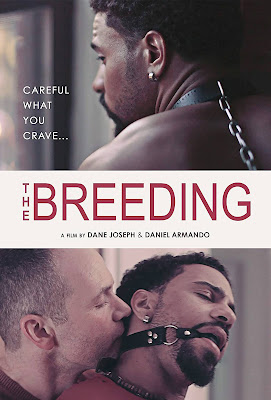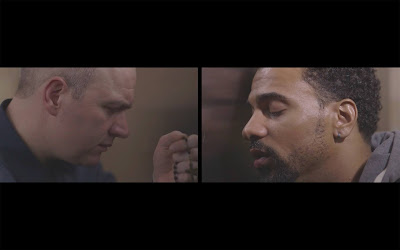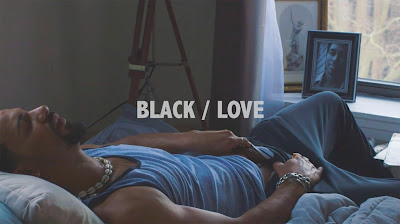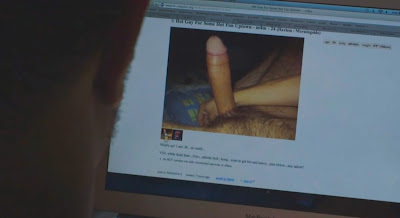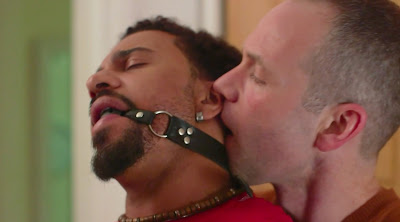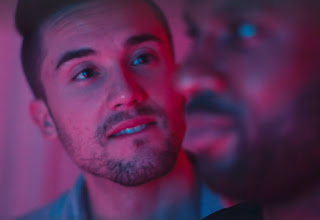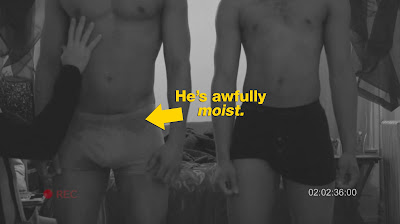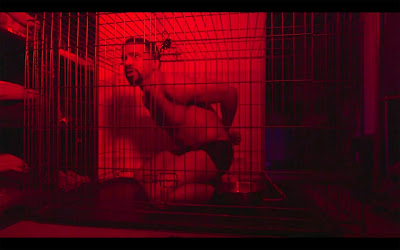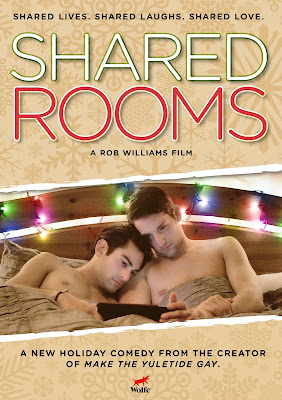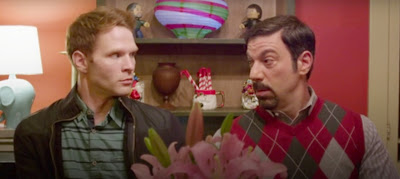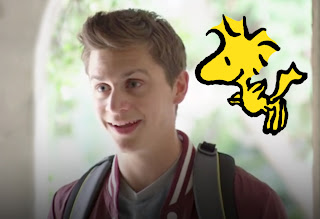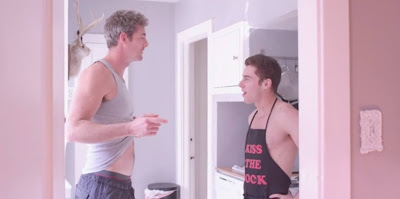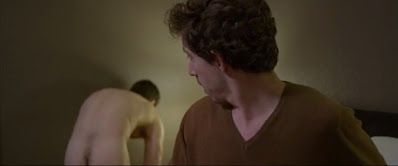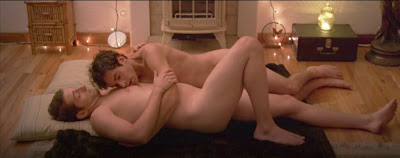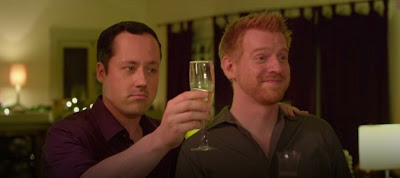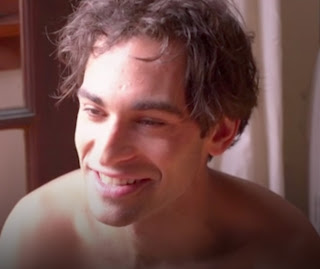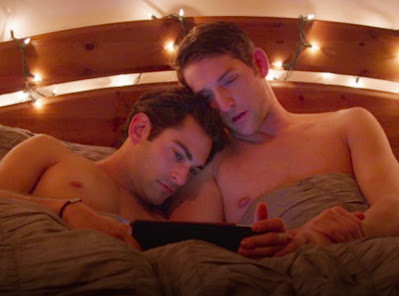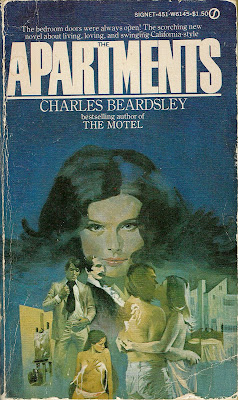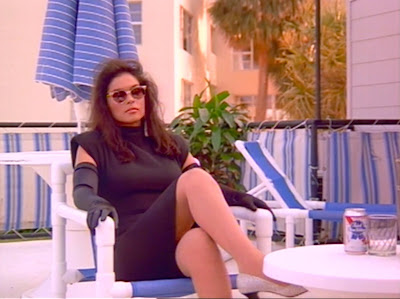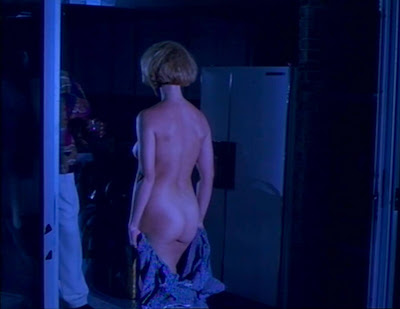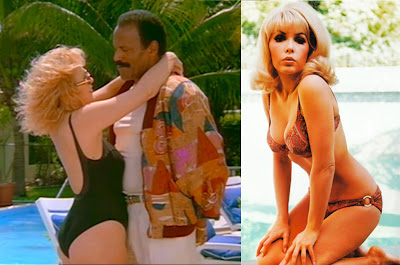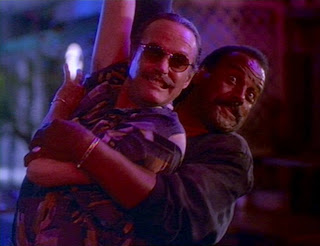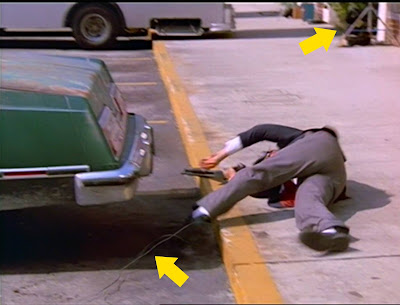Another holiday, another obligatory post about holiday-themed entertainment. My original plan was to review a Christmas-themed gay porn movie from the 1970s, except I couldn’t find one. Oh, there are plenty of Christmas-themed
scenes, but no one seemed to think there was a market for a holiday-themed gay feature during porn’s Golden Age. There’s the new shit, of course, but I really wanted to review something that had a little more narrative than “Santa fucks an elf.”
 |
| Maybe later. |
|
So, I went in the opposite direction, checking out instead three TV movies released this year that feature LGBTQ storylines. And while the networks releasing these movies are getting much praise for including LGBTQ characters, it should be understood that these movies go to great lengths to scrub away all the
sexual from
homosexual. Though, to be fair, the straight characters aren’t exactly dripping with erotic intent. In the world of these movies, romance just means, to borrow a line from a friend of mine, holding hands and thinking pure thoughts.
Let’s start with the Hallmark Channel’s THE CHRISTMAS HOUSE, which premiered this past November. Last year, Hallmark sparked the ire of One Million Moms (which is, reportedly, significantly fewer moms than that) when the network aired an ad for the wedding planning site Zola featuring (gasp!) a lesbian couple. Hallmark pulled the ad, then faced an even bigger backlash. Hallmark, no doubt flustered by the discovery that homosexuals buy shit, too, re-instated the ad and committed itself to creating more inclusive content, of which The Christmas House is a direct result.
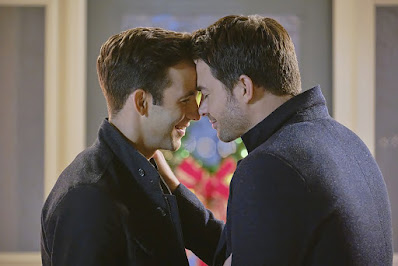 |
Hey gays! Here’s a movie just for you from your
friends at the Hallmark Channel. |
|
|
 |
Psyche! The Christmas House is really about these two.
|
However, I wouldn’t nominate Hallmark for a GLAAD Award just yet, for while
The Christmas House includes gay characters, its primary story is decidedly hetero, and very, very white. The white hetero in question is Mike Mitchell (Robert Buckley, of
iZombie and
One Tree Hill fame), the lead actor of a cheesy TV legal drama
Handsome Justice.
The Christmas House even opens with a scene from the fake show—a daring move, as the self-aware cheese of
Handsome Justice is barely distinguishable from the regular cheese of the Hallmark Channel. After the show wraps for the holidays, Mike learns its current season might be its last. He barely has time to process this news before getting a call from his parents, Phylis (yes, just one ‘l’) and Bill (Sharon Lawrence and Treat Williams, respectively), insisting he move his visit to upstate New York up a couple weeks to help them transform the family home into one big gaudy holiday display, the titular Christmas House. It’s a tradition the family hasn’t kept up in years, but Mom’s just retired from her teaching job and wants a project. (Dad retired a few years earlier—from what, we don’t know, but he must’ve been making bank to afford his wife’s facelifts and transform his home into
Busch Gardens’ Christmas Town.)
Also roped into this project are Mike’s brother Brandon (Jonathan Bennett) and his husband Jake (Brad Harder). Brandon and Jake are trying to adopt a baby, but fuck them, what about Mike getting back together with his childhood crush, Andi (Ana Ayora)? The recently divorced Andi, with her pre-teen son Noah (Mattia Castrillo) in tow, has moved back to her mother’s place next door to the Mitchells. She’s also Mike’s parents’ real estate agent, a revelation that suddenly has Mike getting nostalgic for his childhood home and re-examining his choices. What’s the life of a C-list actor when he could live an upper-middle class life in suburbia with the just-remembered love of his life?
 |
Jonathan Bennett and Brad Harder wait for a seat at the table.
|
|
The Christmas House is pretty much everything I expected from a Hallmark movie: a big bundle of clichés slathered with a glistening glaze of schmaltz. And yet, I didn’t hate it. Buckley is an engaging lead (not to mention very easy on the eyes), well-matched by smoky-voiced Ayora. Lawrence manages a passable Florence Henderson-as-Carol Brady impersonation, while Williams, whose character is fond of bad jokes (“What do you call a Christmas tree that knows Kung Fu? Spruce Lee.”), is endearingly goofy. Bennett and Harder, both out IRL, are fine, but they’re just there to help Hallmark earn brownie points with the LGBTQs and not much else. Their characters could be cut and the story wouldn’t be affected in the slightest.
At least the Paramount Network had the decency to make its gay cast members the leads of DASHING IN DECEMBER. Too bad that’s like if Lehman Brothers named their first Black CEO on September 14, 2008.
Speaking of heartless financial firms, one of Dashing’s main characters, Wyatt Burwall (Peter Porte) works for one. A conversation with Wyatt’s hard-ass boss during an office Christmas party reveals that Wyatt’s on track for a Big Promotion, provided he puts together one more Big Deal, because at this firm, promotions are transactional. To hammer home that Wyatt’s got no work/life balance (and that he works for an asshole), his boss is slightly miffed that Wyatt’s going to Colorado for the holidays to see his mother, whom he hasn’t seen in two years, but is calmed when Wyatt explains he’s taking his laptop along. Happy Holidays! Then Wyatt cruises the party’s hunky bartender. I’m sure they later sneaked away to snort coke and blow each other in a supply closet, but the movie chose not to expose audiences to such trashy behavior. Maybe they’ll include that part as a Blu-ray extra. (Note to Paramount: You most definitely should include that part as a Blu-ray extra.)
 |
“Meet me in the supply closet in 15 minutes.”
|
Though Wyatt hasn’t seen his mother in two years, his reason for returning home isn’t entirely sentimental. It seems the family’s horse farm has been in dire financial straits since Dad died, and Wyatt wants to convince his mother to sell before she sinks all her retirement savings (and his financial assistance) into this money pit. He’s so determined, in fact, that he presents his mother Deb (Andie MacDowell, aging naturally and looking all the better for it) with a sales proposal during dinner on his first night home.
 |
Andie MacDowell’s part is more like a spokesmodel
than a character.
|
 |
The moment Heath knew he
would destroy that ass.
|
Employed by the ranch are Blake (Caroline Harris), who dated Wyatt in high school before he came out and is seemingly the only Black person in Colorado, and Heath (Juan Pablo Di Pace), who may be Colorado’s only gay person. Or so I assume, given his masochistic pursuit of Wyatt. Though the two men exchange interested glances when Wyatt first arrives, Deb’s son is clearly more interested in establishing himself as an insufferable douchebag than pursuing a holiday romance. He keeps “accidentally” calling Heath “Hank,” insults the wine Heath brings for dinner (“You can’t drink this!”) and shows little concern for the employees who will be displaced should Deb decide to sell. Heath is understandably put off by Wyatt’s negging, but…dat ass! Wyatt eventually becomes a little less resistant to Heath’s charms, though for much of the movie he seems to view Heath more as a rival for his mother’s approval than a potential romantic partner. More perplexing is Heath’s continued interest in Wyatt. I, for one, think personality counts for a lot, so if, say, Chris Hemsworth were to treat me like shit, he’d immediately go from a 10 to a 4. I would be open to one night of hate sex, however.
Because the Christmas movie genre mandates that there be no surprises, Wyatt and Heath not only become a couple, but Wyatt manages to save the farm, too, his solution so simplistic and obvious that you’ll question how these characters hadn’t driven the farm into bankruptcy years earlier.
Dashing in December is a prime example of why “TV movie” is a pejorative in so many people’s minds. These movies usually trade in clichés, but few are so nakedly insincere. Dashing looks so much like a 90-minute commercial that I half-expected Andie MacDowell to turn directly to the camera and urge viewers to wrap themselves in savings at Kohl’s while modeling one of her shawls. In fact, it’s remarkable that in this movie that appears specifically crafted for product placement has only one moment that’s blatantly shot to appease a sponsor.
 |
| Subtle. |
Dashing isn’t all bad. Di Pace manages to manufacture a dimension-and-a-half more for Heath from the single one supplied by writer-director Jake Helgren. Plus, he gets bonus points for making the line “You could use some holiday spirit” sound sexually suggestive. And unlike the other TV Christmas movies I watched, Dashing at least acknowledges that its gay main characters have carnal desires, such as when Wyatt, dressed only in holiday-themed boxer briefs, walks into the bathroom and surprises a freshly showered Heath in his holiday-themed boxer briefs. The POV camera pan from Wyatt’s crotch to his rippling torso makes it clear Heath has more in mind than holding hands.
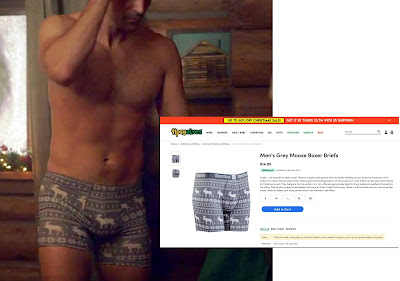 |
Or maybe Dashing in December was just trying to sell boxer briefs.
|
Finally, there’s Lifetime’s LGBTQ Christmas movie offering, THE CHRISTMAS SETUP. I’ll confess that I didn’t go into this with an entirely open mind. I, like a lot of people, don’t hold Lifetime TV movies in high esteem. This is the network that gave us Liz & Dick and Drew Peterson: Untouchable, after all. Granted, I enjoyed both those movies, but only because I watched them ironically. I fully intended to watch The Christmas Setup ironically as well.
There’s certainly nothing about The Christmas Setup’s story that makes it unique. Once again, we have a New York-based gay son with a demanding career — an attorney this time out — angling for a promotion. And once again, that son, Hugo (Ben Lewis), leaves town for the holidays to visit his mother, who resides in a slower-paced, gentler town (I’m not sure if that describes Milwaukee, but it’s not Manhattan, so sure). He brings along Madelyn (Ellen Wong), his BFF, because what else is she going to do, visit her own family? Oh, fuck no!
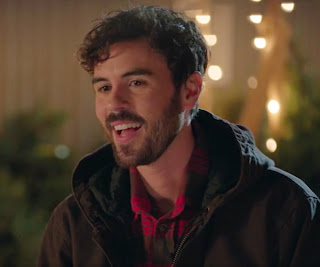 |
Patrick (Blake Lee) sells Christmas trees
and creates wood.
|
But if Hugo and Madelyn think they’ll have relaxing visit, Hugo’s widowed mom Kate (Fran Drescher) has another think coming to them. She’s chairing the neighborhood Christmas festival and she’s already volunteered her visitors to assist in setting it up. I can relate; this is the kind of shit my mom likes to do. However, unlike when she volunteered my brother and I to assist at one of her church events, Hugo does not yell at his mother about having no respect for his time, as well as saying a lot of things that he’ll regret later, and Kate does not scream things like, “Well, I’m sorry I’m such a
horrible mother!” before bursting into tears and then locking herself in the bathroom for an hour. No, Hugo just makes a few halfhearted protests before doing what his mother asks.
One of the things Hugo’s asked to do is take a Christmas tree delivery from Patrick (Lewis’ real-life husband Blake Lee), and I’ll have to admit that would make me pretty agreeable to having my Christmas break hijacked. Patrick is one of those impossibly perfect people that only exist in fiction: handsome, financially independent (he created an app, sold it and was able to retire in his early thirties), and genuinely nice. I’m sure he has an eight-inch cock, too. The attraction between the pair is immediate, but Hugo can’t seem to get out of his own way. At one point I found myself shouting at the TV, “C’mon, does he have to slap his dick in your face for you to get a clue?” Also: “Can that be in a scene, please?”
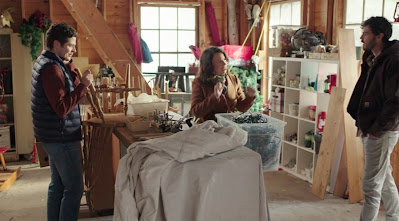 |
“So, are you two ever gonna fuck?”
|
I wasn’t the only one waiting for Hugo to get a clue. Kate has been steering Hugo into Patrick’s orbit, hoping her son will get a boyfriend for Christmas, hence the movie’s title. She’s not as overbearing a matchmaker as she is a Christmas festival chair, and her restraint pays off as the two guys find their way into a sweet romance. She even gets a bonus match-up when her older son Aiden (another out actor, Chad Connell, who really does a pair of pants justice) comes home and takes a liking to Madelyn.
Halfway through The Christmas Setup I was suddenly struck with the realization that, holy shit, this movie is actually good. It’s no holiday classic (in my book, that would be Christmas Evil and/or White Reindeer), but it was by far the best of the 2020 Christmas LGBTQ movies I watched for this post, and that’s largely attributable to the cast’s performances. Real-life partners don’t always have the same chemistry on screen (#Bennifer), but the romantic sparks between the charmingly adorkable Lewis and the oh-so-fuckable adorable Lee are palpable. Drescher is an actress I generally prefer in small doses (I can take only so much of her foghorn of a voice, which sounds a bit rusty these days), yet even though The Christmas Setup exceeds that dosage I enjoyed having her around. I just wish writer Michael J. Murray had given her a sarcastic edge to take full advantage of Drescher’s strengths. (We’ll overlook that someone who fought to ensure The Nanny reflected its titular character’s Jewish heritage is playing a character who’s positively moist for Christmas.)
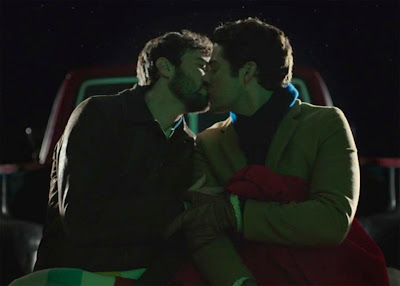 |
Awwww! They’re so cute, I want to slap them.
|
Above all, even though
The Christmas Setup’s story isn’t much different from
Dashing in December’s and its script not much wittier than
The Christmas House’s, it’s clear everyone involved is committed to the project, and their enthusiasm is infectious. Good job, Lifetime! But I’m still plan on making fun of your movies in the future.
Xmas Excess, Moms and Empty Cups
The three 2020 Christmas TV movies had a lot more in common than just including gay actors and characters. All three exist in a world where the so-called War on Christmas has been won and Santa has been named Dictator for Life, with Gretchen Carlson his second in command. In this world, if you don’t spend at least $75 grand on Christmas decorations you’re a motherfucking Grinch and should go back to whatever godless nation you came from. The characters in Dashing at least have a business reason for decking the halls so extravagantly, and yet they are the most restrained, creating what I imagine a Crate & Barrel holiday theme park would look like. And neighborhood Christmas festivals aren’t exactly known for their understatement, so The Christmas Setup also gets a pass. But the Mitchells in The Christmas House need to seriously re-think their priorities. How about dialing back the decorations a little bit, maybe donate the $50,000 savings to a food bank or homeless shelter? Or do I not understand the true meaning of Christmas?
I also found it interesting that while all three of these movies hyped their inclusion of gay characters and talent, both in front of and behind the camera, they didn’t strike me as being made for gay audiences. Instead, I think the target audience is their mothers. All three movies make visiting and helping mom the catalyst of their respective stories, and all three, with their sweet, sexless romances and mild humor meant to be cute rather than funny, seem designed to warm Mom’s heart more than truly reflect the lives of the gay characters. Granted, a lot of this is attributable to network branding (the Hallmark Channel isn’t exactly known for edgy content), but I think a truly gay Christmas movie would have more sexiness and sarcasm than straight sugary sentimentality.
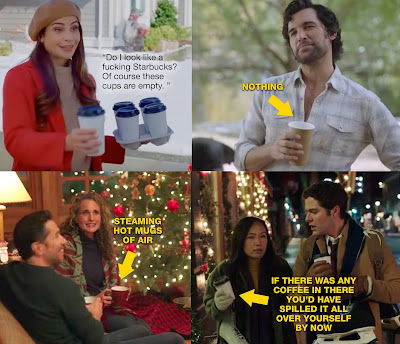 |
Hallmark, Paramount and Lifetime were ready to present
LGBTQ characters, but still reticent about showing hot beverages.
|
Finally, what’s up with the empty cups? In every one of these movies characters drink from obviously empty coffee cups. In the rare instance liquids are poured into these cups at all, it’s a fraction of the amount a person would normally drink. I’m sure if any P.A. brought a producer or director of any of these movies a cup containing four tablespoons of coffee they would get a dressing down that would make
Tom Cruise’s recent on-set tirade seem like a polite reminder about workplace safety. They might even be killed. The only time these movies — and TV in general — seems to show an interest in accurately reflecting how people consume beverages is when characters are drinking alcohol. Only then can characters pour liberally and often.
